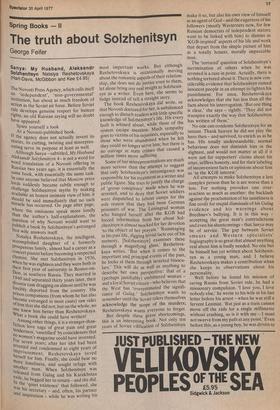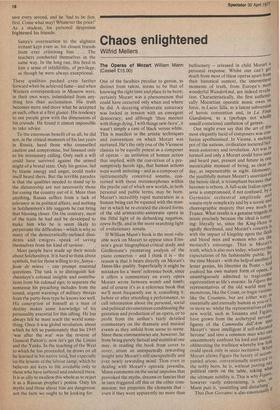The truth about Solzhenitsyn
George Feifer Sanya: My Husband, Aleksandr Solzhenitsyn Natelya Reshetovskaya (Hart-Davis, McGibbon and Kee £4.95) The Novosti Press Agency, which calls itself an 'independent', 'non-governmental' institution, has about as much freedom of action as the Soviet air force. Before Soviet rule develops genuine respect for human rights, an old Russian saying will no doubt have appeared:
Spare yourself a look At a Novosti-published book. If the agency does not actually invent its stories, its cutting, twisting and misrepresenting serve its purpose at least as well.
Although Sanya —subtitled, My Husband Aleksandr Solzhenitsyn 4— is not a word for word translation of a Novosti offering in Russian two years ago, it is essentially the same book, with essentially the same task. In case anyone believed that Moscow press lords suddenly became subtle enough to Challenge Solzhenitsyn myths by making available an honest intimate view of him, it should be said immediately that no such miracle has occurred. On page after page, Where the omissions speak more loudly than the author's half-explanations, the question of why Novosti would want to PUblish a book by Solzhenitsyn's estranged first wife answers itself. Natalya Reshetovskaya, the intelligent, accomplished daughter of a formerly Prosperous family, almost had a career as a concert pianist before becoming a respected chemist. She met Solzhenitsyn in 1936, When he was eighteen and they were both in their first year of university in Rostov-onbon, in southern Russia. They married in 1940 and separated thirty years later, their divorce case dragging on almost until he was forcibly deported from the country. His Prison companions (from whom he has also become estranged in most cases) saw sides of him that she did not; but on the whole, no one knew him better than Reshetovskaya. What a book she could have written!
_ Among other things, it is a stranger-thanfiction love saga of great pain and great tenderness, 'sanctified' by coincidences that
Women's magazine could have invented. r or seven years, after her idol had been arrested and condemned to eight years of .troprisonment, Reshetovskaya saved herself for him. Finally, she could bear no More loneliness, and sought refuge with another man. When Solzhenitsyn was released from Gulag and his Kazakhstan exile, he begged her to return — and she did. n the 'quiet existence' that followed, she Was his secretary — and, often, his partner 'arid inspiration — while he was writing his most important works. But although Reshetovskaya is occasionally moving about the romantic aspects of their relationship, she does not do justice even to them, let alone bring any real insight to Solzhenitsyn as a writer. Even here, she seems to fudge instead of tell a straight story. The book Reshetovskaya did write, or that Novosti doctored for her, is unbalanced enough to disturb readers with little specific knowledge of Solzhenitsyn's life. His every fault is whined about, while those of the system escape mention. Much sympathy goes to victims of his injustices, especially to those who were abandoned when he felt they could no longer serve him; but there is no outrage at state crimes that caused a million times more suffering.
Some of her misrepresentations are much more serious than the attempt to suggest that only Solzhenitsyn's intransigence was responsible for his treatment as a writer and public figure. She tries to justify the charge of 'group conspiracy' made when he was arrested, and to deny that Soviet soldiers were dispatched to labour camps for the sole reason that they had been German prisoners of war. The Leningrad woman who hanged herself after the KGB had forced information from her about Solzhenitsyn is almost mocked for her devotion `to the object of her prayers.' 'Rummaging in his past life, digging trivial facts out of his memory, [Solzhenitsyn] examines these through a magnifying glass,' Reshetovskaya writes. But when it comes to the important anct principal events of the past, he looks at them through inverted binoculars.' This will do as well as anything to describe her own perspective: that of a (perhaps justifiably) embittered woman — and a loyal Soviet citizen —who believes that the West has 'overestimated the significance of Gulag.' SOlzhenitsyn wants to remember until the Soviet rulers themselves acknowledge the scope of the murders; Reshetovskaya wants everyone to forget.
But despite these grave shortcomings, this is an interesting book. Not only ten years of Soviet vilification of Solzhenitsyn make it so, but also his own view of himself as an agent of God— and the eagerness of his followers (mostly Westerners now, for few Russian democrats of independent stature want to be linked with him) to dismiss as 'KGB-inspired' aspects of his life and work that depart from the simple picture of him as a totally honest, morally impeccable man.
The 'tortured' question of Solzhenitsyn's incrimination of others when he was arrested is a case in point. Actually, there is nothing tortured about it. There is now considerable evidence that Solzhenitsyn named innocent people in an attempt to lighten his punishment. For once, Reshetovskaya acknowledges that she has less than all the facts about his interrogation. 'But one thing is clear,' she says — rightly. 'They did not transpire exactly the way that Solzhenitsyn has written of them.'
No one can condemn Solzhenitsyn for an instant. Thank heaven he did not play the hero then — and survived, to enrich us as he has. His totally understandable, normal behaviour does not diminish him in the slightest, and would not matter at all if it were not for supporters' claims about his utter, selfless honesty, and for their labeling of inconvenient facts or opinions about him as 'in the KGB interest.'
All attempts to make Solzhenitsyn a less complex person than he is are worse than a loss. For nothing provokes one overreaction so much as another: the backlash against the proclamation of his saintliness is fine cover for stupid dismissals of his Gulag evidence and his warnings about Brezhnev's bullying. It is in this way accepting the great man's contradictions and even his shortcomings — that Sanya may be of service. The gap between Soviet smears and Western specialists' hagiography is so great that almost anything real about him is badly needed. No one but he himself has yet written about Solzhenitsyn as a young man, and I believe Reshetovskaya makes a contribution when she keeps to observations about his personality.
Well before he found his mission of saving Russia from Soviet rule, he had a missionary compulsion. 'I love you, I love nobody else,' he wrote to his wife in his last letter before his arrest — when he was still a fervent Leninist. 'But just as a train cannot move off the rails for a single millimetre without crashing, so is it with me — I must not swerve from my path at any point.' Even before this, as a young boy, he was driven to save every second, and he 'had to be first, first. Come what may! Whatever the price!' As a student, his personal despotism frightened his friends: Sanya's overreaction to the slightest irritant kept even us, his closest friends from ever criticising him . . . The teachers conducted themselves in the same way. In the long run, this bred in him a sense of infallibility, of privilege, as though he were always exceptional.
These qualities pushed even further forward when he achieved fame — and when Western correspondents in Moscow were, in their own ways, intimidated from anything less than acclamation. His truth becomes more and more what he accepted as such, often at a first glance. His tendency to use people grew with the dimensions of his crusade. He found it almost impossible to take advice.
To the enormous benefit of us all, he did not, in the critical moments of his last years in Russia, heed those who counselled caution and compromise, but listened only to his missionary calling. Only such a will could have survived against the armed might of a brutal state. Only his genius, fed by titanic energy and anger, could make itself heard there. But the terrible paradox is that the qualities needed to stand up to the dictatorship are not necessarily those for easing the country out of it. More than anything, Russia suffers from a lack of tolerance in its political affairs, and nothing in Solzhenitsyn's life suggests he can bring that blessing closer. On the contrary, most of the traits he had and he developed to make him who he is seem likely to perpetuate the difficulties — which is why so many of the democratically-inclined dissidents and emigres speak of saving themselves from his kind of saviour.
Most people have made up their minds about Solzhenitsyn. It is hard to think about symbols, but for those willing to try, Sanya — faute de mieux — can prompt essential questions. The task is to distinguish Solzhenitsyn's colossal insights and contributions from his colossal ego; to separate the nonsense his preaching includes from the sound, urgent warnings of military threats from the party-boss type he knows too well. His conception of himself as a man of destiny makes some knowledge of his personality essential for this sifting. He has always felt he must teach the world something. Once it was global revolution, about which he felt so passionately that his 1945 'war after the war' was the reverse of General Patton's: now let's get the Limies and the Yanks. In the teaching of the West to which he has proceeded, he draws on all he learned in his native land, but especially on the lessons of the labour camp, which be believes are keys to life available only to those who have suffered and endured there. It is as silly to swallow this whole as to reject it as a Russian prophet's potion. Only his myths and those about him are dangerous: not the facts we ought to be looking for.



































 Previous page
Previous page